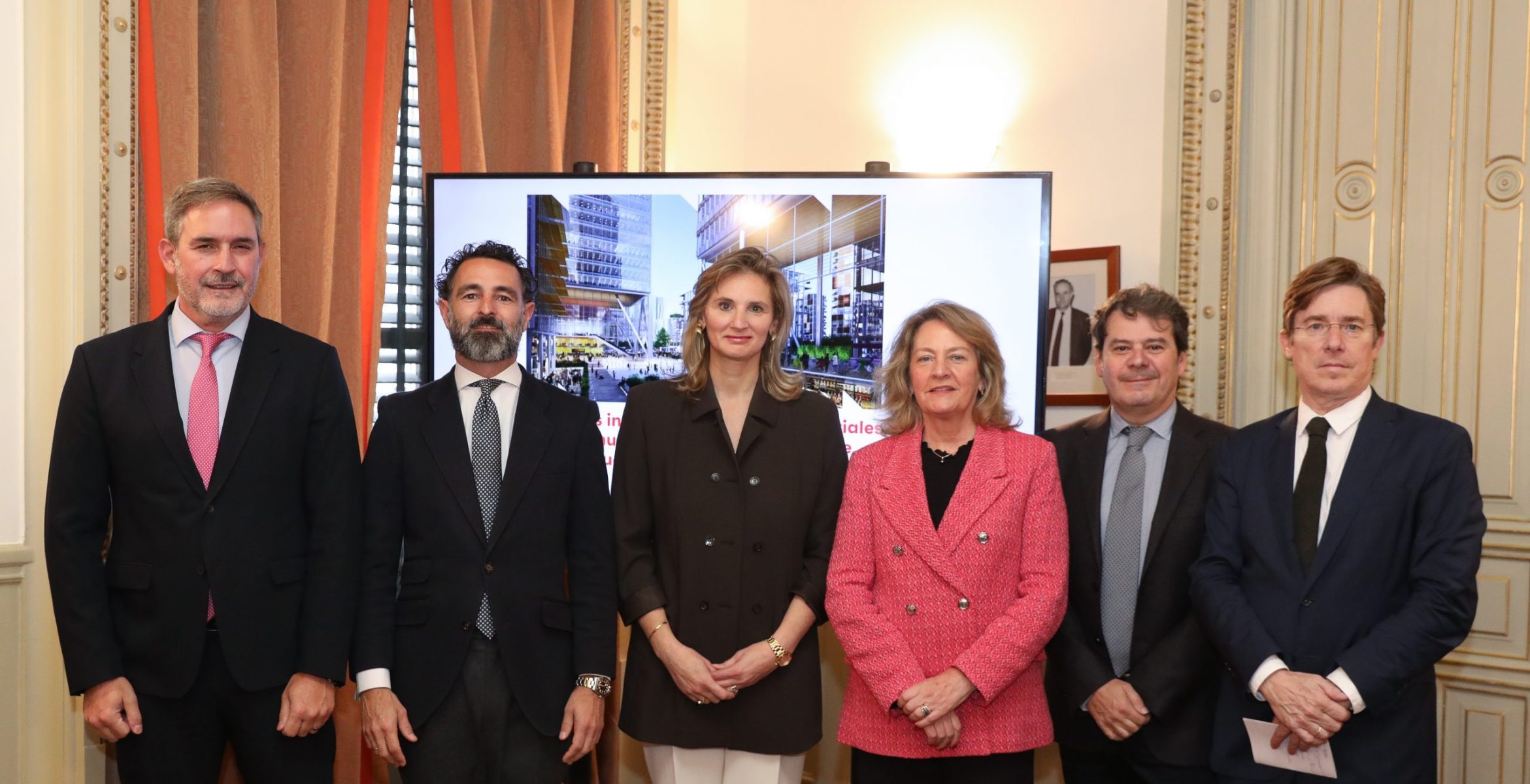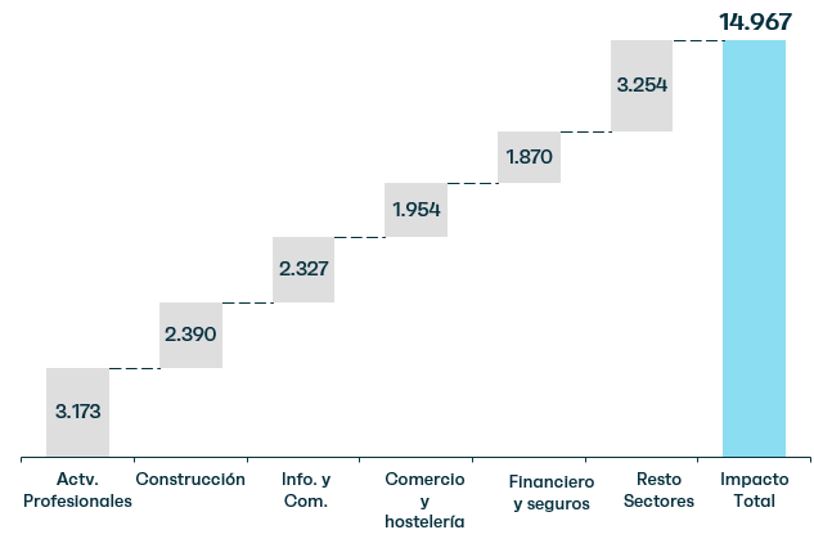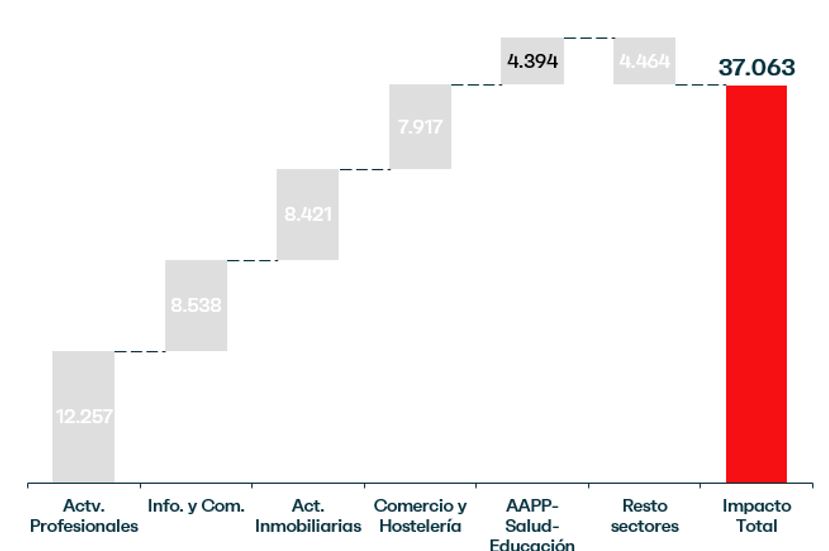for Madrid Nuevo Norte

Madrid, 14 November 2022. The major urban transformation project known as Madrid Nuevo Norte will provide a huge boost to the city’s economy and the surrounding region, with a very positive impact on the main sectors of activity in the region. Specifically, more than 17 B€ will be invested in its construction and development, which will subsequently generate an economic impact of around 52 B€ in the region’s main sectors of activity, according to the multivariate dynamic model estimated using Regional Accounting data.
These are just a few of the figures given in the study on Real Estate Impacts and sectoral networks in the Region of Madrid: the case of Madrid Nuevo Norte, conducted by the Universidad Complutense de Madrid (through ICAE), which analyses impact according to the investment needed for development, concluding that for every euro invested in the construction and development of Madrid Nuevo Norte, triple the long-term economic impact will be generated over the next 30 years at least.
The study was presented today by its director, Luis A. Puch, ICAE Professor at the Universidad Complutense de Madrid, at an event held in the Colegio de Economistas de Madrid (CEMAD) to explain the strategic contribution this project will make to the country’s economy.
The presentation event was attended by the Director of Finance and Investor Relations at Crea Madrid Nuevo Norte, Sergio Criado, and Madrid’s Regional Councillor for the Environment, Housing, and Agriculture, Paloma Martin, who highlighted the “major economic transformation” this project will bring, “boosting growth in the Region of Madrid over the next 30 years”. She went on to say that it will “place the Region of Madrid at the cutting edge of urbanism in the 21st Century, and will provide us with the most innovative business district in southern Europe, capable of attracting talent and business activity that will drive the knowledge economy. Its launch, at a moment of such uncertainty in the Spanish economy, offers an unbeatable incentive for national and international investors, and a confidence boost for our productive sectors”.
This report divides the impact into two different stages: construction and subsequent development, which will begin with the commercialisation of the buildings.
In relation to the construction stage, the report notes that the 7 B€ of ongoing investment required to build Madrid Nuevo Norte (excluding the purchase of land) will generate an impact of around 15 B€ by the year 2050, with the Professional Activities sector benefiting the most (with an impact of 3,173 B€) – encompassing for example consultancy firms, technical studios and engineering companies, and legal services, accounting and resource management, advertising and marketing – followed by the Construction sector itself (2,390 B€) – construction firms, materials suppliers and civil engineering firms -, Transport and Information and Communication Technologies (ICTs) (2,327 B€), Retail and Hospitality (1,954 B€), and Finance and Insurance (1,870 B€).

The stage encompassing residential and tertiary real estate development will require an investment of 10,105 B€, which will in turn generate an impact of 37 B€ on clients over the next 30 years, with the greatest beneficiaries being Professional Activities – as described for Construction but understood now as clients/users of real estate developments (12,257 billion) – Transport and Information and Communication Technologies 8,538 billion) -computer and programming firms, and all types of ICTs (real estate portals, online search engines), and media, together with passenger and goods transport firms (airlines, shipping companies…) followed by Real Estate Activities (8,421 billion) – buying, selling, and renting properties, APIs, etc-, Retail and Hospitality (7,917 billion) and Public Administrations – Health, Education (4,394 billion).

According to the study conducted by the Universidad Complutense de Madrid, the positive impact of Madrid Nuevo Norte on the regional economy will be continuous for a period of more than 30 years, with significant estimated dynamic effects.
Specifically, in terms of the construction stage, over the first 12 months of the project (2021-2033), 56% of the total impact will be generated (8.4 B€) in relation to suppliers, and in the next 12-year period, 37% (5.5 B€) will be generated, with additional positive effects that might stretch beyond 2050.
As for the real estate development phase, 55% of the total impact (20.6 B€) that this boost will have for real estate clients/users will be generated during the 20 years after the first investments in real estate. Indeed, the durability of this long-term positive impact is particularly striking and is expected to last until the year 2100.
In this second phase, as the report sets out, investment in real estate corresponds to investment in developments, excluding the cost of buying the land and the cost of construction corresponding to residential and tertiary buildings, which is deducted to avoid double accounting.
The study, led by Professor Luis A Puch from UCM, alongside a team of researchers from the Complutense Institute of Economic analysis, also analyses the transmission of the economic impacts created by the Madrid Nuevo Norte project through the sectoral network of productive activity in the Region of Madrid and the greatest possible level of sectoral disaggregation (regional Input-Output framework).
Specifically, the report finds that, because of the weight of the Construction and Real Estate sectors within the Region of Madrid’s economy, investment in Madrid Nuevo Norte will spread through Madrid’s sectoral network, driving demand (upstream, towards suppliers): investments in Construction and Real Estate in this project will increase regional GDP growth by almost 43% through this effect on demand.
The study also finds that the effects on supply (downstream, towards customers) could bring close to two additional percentage points to Madrid’s economic growth. Encouraging business activity through the possibilities offered by the MNN project is the best way to boost supply effects, thereby achieving significant improvements in productivity in Madrid and Spain.
This report, drawn up by the Complutense Institute of Economic Analysis (ICAE), part of the Universidad Complutense de Madrid, follows on from another report drafted by the Universidad Autónoma de Madrid, through the Lawrence. R Klein Institute of Economic Forecasting, which analysed the strategic contribution of this project to the country’s economy in the mid-term, reflecting key figures, such as the contribution Madrid Nuevo Norte will make to regional GDP, 15.2 B€, and, 5,868 B€ of positive fiscal impact, and the creation of 348,064 jobs, of which 201,576 will be generated during the construction stage, and another 146,488 thanks to the activity in the neighbourhoods, as offices and retail outlets gradually move in.